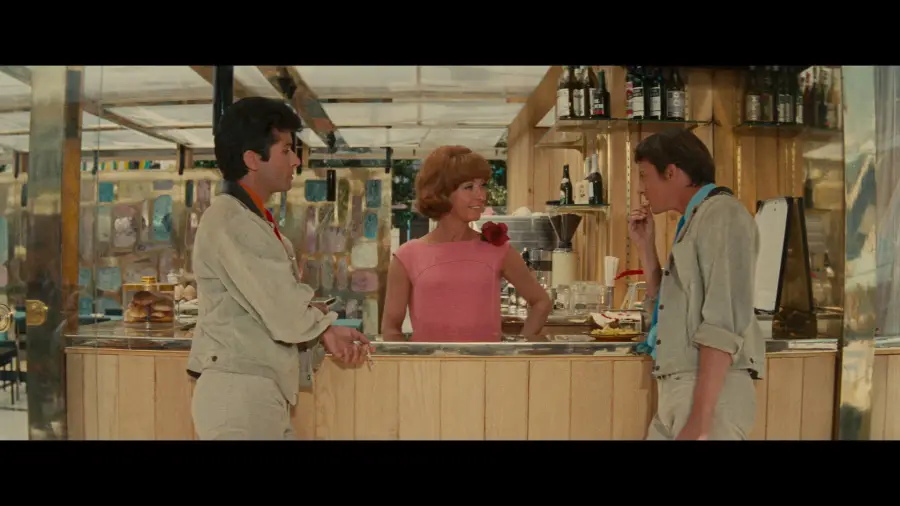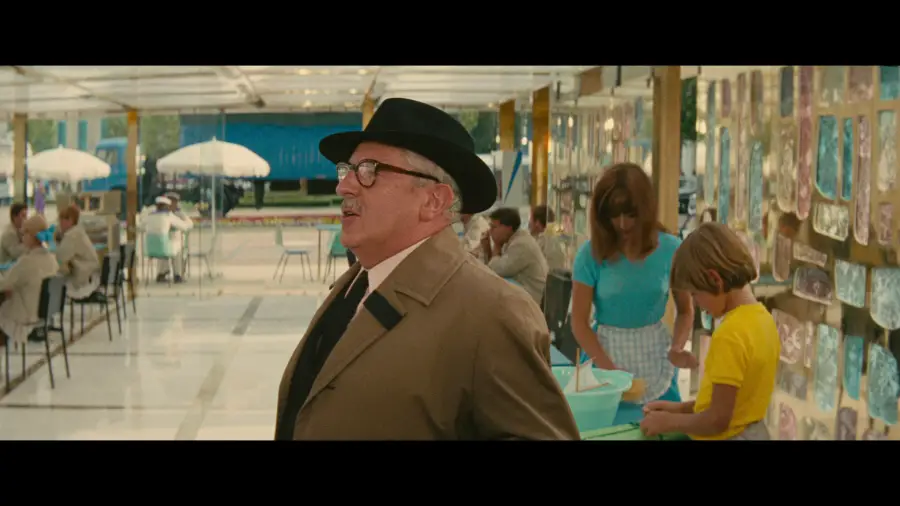The Young Girls of Rochefort

See more details, packaging, or compare
Synopsis
Jacques Demy followed up The Umbrellas of Cherbourg with another musical about missed connections and second chances, this one a more effervescent confection. Twins Delphine and Solange, a dance instructor and a music teacher (played by real-life sisters Catherine Deneuve and Françoise Dorléac), dream of big-city life; when a fair comes through their quiet port town, so does the possibility of escape. With its jazzy Michel Legrand score, pastel paradise of costumes, and divine supporting cast (George Chakiris, Grover Dale, Danielle Darrieux, Michel Piccoli, and Gene Kelly), The Young Girls of Rochefort is a tribute to Hollywood optimism from sixties French cinema’s preeminent dreamer.
Picture 9/10
The Young Girls of Rochefort—the fourth film in Criterion’s Essential Jacques Demy box set—is given a dual-format edition presenting the film in its original aspect ratio of 2.35:1. The dual-layer Blu-ray disc presents the film with a new 1080p/24hz high-definition digital transfer. A standard-definition version is found on the dual-layer DVD, which enhances the film for widescreen televisions.
Like Umbrellas of Cherbourg it’s a very colourful film, though not as elaborate: where Umbrellas had a wide array of colours in practically every shot, with colours changing drastically from shot to shot and angle to angle, Rochefort has predominantly white backgrounds with bright, colourful foreground objects and costumes. Blues, pinks, and reds are wonderfully rendered, particularly the twins’ pinkish/reddish dresses during the final performance. There are times where the colours look a little over-saturated or even under-saturated but it could be intentional. Whites are clean and nicely balanced without any instances of blooming, and black levels are also fairly deep without hiding any details.
Detail is very good on close-ups and film grain is rendered cleanly and naturally, but long shots aren’t as sharp as I would have expected. The print is in stellar shape, the restoration work looking to have cleaned up the source prints nicely.
The DVD’s standard-definition presentation is also pretty good. Compression is a little more noticeable and reds and blues just aren’t as pure here, but for a DVD transfer it’s fairly good.
Thankfully the transfer is another strong one in the set, nothing like the horrific botch-job done on Lola. It’s clean, vibrant, and looks very much like film. It’s a strong high-definition presentation.








































Audio 8/10
The 5.1 surround track (presented in DTS-HD MA on the Blu-ray and Dolby Digital on the DVD) is a pleasantly mixed one, spreading the film’s music between all of the speakers, nicely enveloping the viewer. The music sounds rather good, not hindered by age in anyway, with superb dynamic range and fidelity. Regular dialogue sequences sound a little flatter in comparison but the overall track is very clean and could pass as something recorded today, not something from 1966.
Extras 9/10
The disc is also another one of the more stacked editions in term of supplements. It contains another archival interview featuring the director, again from an episode of the French program Cinéma. It features Demy and composer Michel Legrand working on the music for the film, trying to figure out how the dance numbers will work and how to end the song correctly, the latter of which becomes a rather touchy subject between the two. They then both sit down to talk about the film and their desire to make a more traditional musical and how they collaborate. It runs 11-minutes.
Criterion has then recorded a new discussion between film scholar Jean-Pierre Berthome and costume designer Jacqueline Moreau, widow of one of Demy’s frequent collaborators, production designer Bernard Evein. During the 26-minute conversation the two discuss Demy’s and her husband’s work together. She recalls how she first met Demy and then their early work together, particularly The Umbrellas of Cherbourg which presented a particular challenge due to the colours that Demy wanted: the basically had to break down every scene in the film and plan the colour schemes precisely for each so nothing would clash. She then talks about her husband’s work, focusing mostly on The Young Girls of Rochefort as they go through his concept drawings.
That interview starts out fairly dry but picks up as it goes. Much better (and competing for best feature on the disc) is a 1966 episode from the French television program Behind the Screen, focusing on the making of The Young Girls of Rochefort. This 35-minute episode spends a lot of time looking at the film’s production design and includes a fairly extensive interview with Bernard Evein, who covers the work they’re doing and gives a great overview of what a production designer does and how one works with the director. There’s also an interview with producer Mag Bopard and a rather intriguing one with the mayor of Rochefort, who talks about some of the issues that came up with letting the crew in and some of the things he’s really enjoyed (like overhearing the musical numbers during work hours.) Local businesses really benefitted from the production, getting free paint jobs and repairs for the film. Most intriguing, though, is behind-the-scenes footage of the twins’ musical number: we actually get to see the musical number performed in both French and English. I wasn’t actually aware of an English version of the film and doing online research didn’t actually yield much about it, but just seeing this footage was a real treat. This was a great find on Criterion’s part, but what’s disappointing about it is that it’s only the second episode of what was apparently a six-part run, so it’s a bit of a letdown not to see the rest of the material since this lone episode suggests a wonderfully engaging behind-the-scenes piece.
Also a strong addition is the 1993 documentary The Young Girls Turn 25. The 66-minute documentary, directed by Demy’s widow Agnes Varda, revisits Rochefort during a festival celebrating the 25th anniversary of the film. She captures plenty of the festivities while also getting interviews with many of the locals and members of the cast and crew (including Deneuve) who all recall the experience. It also shows more English footage from a musical number. It had a profound impact on the town and the documentary really captures that and is all the more fun because of it. As a nice bonus it has also been beautifully restored, where even the production footage looks amazing. It’s also delivered in 1080p/24hz, and looks about as good as the main feature. A great inclusion.
(As a note The Young Girls at 25 only appears on the Blu-ray. The DVD version of the supplement has actually been included on the second disc of Une chamber en ville.)
The supplements then close with a the re-release trailer for the film. Surprisingly there is no restoration demonstration to be found.
There’s obviously material missing (the rest of that television making-of, and more footage from the English version) but what remains is fantastic, with a couple of the stronger ones of the entire set found here. All of it is worth viewing.
Closing
Another strong edition in Criterion’s Jacques Demy set, delivering an excellent roster of supplements and solid, filmic transfer.








